Self-Coached Dathan Ritzenhein Launches Comeback at Great North Run
Self-Coached Dathan Ritzenhein Launches Comeback at Great North Run
As Dathan Ritzenhein led Mo Farah through the streets of the Great North Run, all he could hear were deafening shouts of "Go, Mo!" from the crowd. The Briti
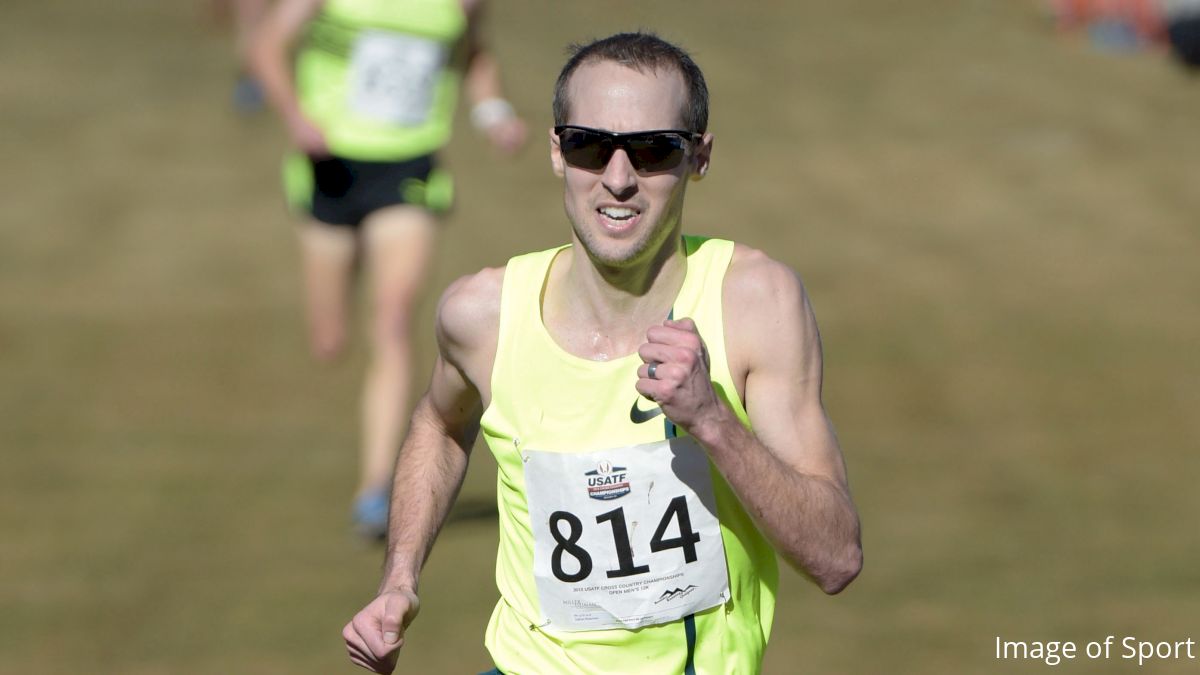
As Dathan Ritzenhein led Mo Farah through the streets of the Great North Run, all he could hear were deafening shouts of "Go, Mo!" from the crowd. The British fans clearly favored their national hero and four-time Olympic champion.
But Ritzenhein, a three-time Olympian for the United States, was intent on winning the half marathon and beating his former Nike Oregon Project training partner. He assumed the lead from the gun, and led through the first mile in 4:34, the 5K in 14:15, the 8K in 23:06, and eventually the 15K in 42:36. By the 15K mark, the race was down to Ritzenhein and Farah with the American controlling every step.
But Farah made a crucial move with 2K remaining -- the hometown hero surged ahead of Ritzenhein on a steep downhill. Ritzenhein, who is putting in 100-mile weeks for the New York City Marathon, was unable to cover the move and followed Farah with a second-place finish in 60:12.
The 33-year-old had just coached himself to his second-fastest half marathon of his career and his fastest mark since 2009 when he claimed bronze at the world championships.
"I was really happy with it. It's been a couple years since I had been to that race. I knew I was in good shape, but you never know until you actually put it out there," Ritzenhein told FloTrack in a phone interview.
It had been some time since Ritzenhein had "put it out there" against intense competition. He dropped out of the U.S. Olympic Marathon Trials due to leg cramps, and didn't attempt to make the Olympic team on the track in June. But after the Marathon Trials, he came to an important realization about his future in the sport.
"I was able to train [after Marathon Trials] but I hadn't been on the track or anything like that… I don't think I had the desire to be on the track again. I wanted to be on the team, but I didn't really want to be on the track, either," Ritzenhein said.
"It was just a matter of realizing that American distance running is so good now, you have to be 100 percent to make those teams and I came to the conclusion in June that these guys are so ready to make this team and so focused. I'm good, but my time is done here on the track. It was a good moment, kind of enlightening that I can put that behind me and know that it's all right."
Ritzenhein began coaching himself when he moved from Portland, Oregon, back to his hometown area of Grand Rapids, Michigan, two and a half years ago. While in Portland, Ritzenhein trained under Alberto Salazar with the Nike Oregon Project. His storied career includes competing at the 2004, 2008 and 2012 Olympic Games and notching the third-fastest marathon in American history. He ran 2:07:47 at the 2012 Chicago Marathon.
After years under talented coaches, Ritzenhein is now living a fulfilling lifestyle close to his family. He feels he has the best mindset to successfully coach himself at this stage of his career, which appears to be a resurgence.
"I've been fortunate. I've trained under several different coaches with different training philosophies, but now that I coach myself, I just have to work with what I intuitively feel works best for me," he said.
FloTrack filmed Ritzenhein training back home in the fall of 2014:
Ritzenhein trains primarily on dirt roads, and most of his training is done alone, but he has a system figured out which works perfectly for his needs.
"I know that I can't really go crazy-fast like I used to. It's not worth the risk for me, so I haven't been on the track at all. I do everything on the dirt roads. I have every 100 meters marked out for 2K on a dirt road out in the country. I do all my intervals out there. I still do some fast stuff -- 4:20 miles and 52-second quarters -- but they're on a dirt road," Ritzenhein said.
"I throw the time out the window a little bit, because if I was on a track, I know I'd be running a lot faster, but I just have to go by the effort."
Ritzenhein said the first six months of self-coaching were difficult, but he found his stride when he began to master the mental aspects of accountability and self-discipline.
"You have to be really honest with yourself because it's hard emotionally; you'll think about your training differently than if you have a coach. The coach gives you what you need, you follow the coach's instructions. But if you're coaching yourself, you can easily pull yourself at some points," he said.
"So I just have to be really disciplined, be confident in what I've done, and not push it any further. And sometimes, you have to be able to talk yourself up. A coach isn't only there to tell you what to do. They are there to motivate you. I've never had a lot of problems with motivation, but at the same time, you have to really want it more than anything. No one is there to push you along, you have to push yourself."
Ritzenhein had to especially push himself while watching the Olympic Games in Rio from his couch in Michigan. For the first time in over a decade, Ritzenhein was not competing for Team USA. Despite the initial frustration, Ritzenhein used the experience to motivate him even more for the marathon.
"Not making the Olympic team and watching it from home, that motivated me a lot, and so I'm going into this fall with a lot of passion. It's important that you never lose that, because if you lose that, you'll never be able to put in the training and the mindset of what it takes to get the most out of yourself," Ritzenhein said.
"Not that I was in a funk, bit it definitely gave me a big kick-start."
With his track days behind him, Ritzenhein is setting his sights on big goals at major marathons, and carries newfound confidence from the Great North Run. The first test will be at the New York City Marathon on November 6, his first time racing in New York since claiming eighth in 2010.
"I feel like I'm in still in my prime," he said. "I've run 2:07, but I know I can run faster -- especially after this weekend, seeing how close I was to my half marathon PR. But at the same time, I'm not even thinking about that. I'm just thinking about doing the best I can and winning one of these things one day."
But Ritzenhein, a three-time Olympian for the United States, was intent on winning the half marathon and beating his former Nike Oregon Project training partner. He assumed the lead from the gun, and led through the first mile in 4:34, the 5K in 14:15, the 8K in 23:06, and eventually the 15K in 42:36. By the 15K mark, the race was down to Ritzenhein and Farah with the American controlling every step.
But Farah made a crucial move with 2K remaining -- the hometown hero surged ahead of Ritzenhein on a steep downhill. Ritzenhein, who is putting in 100-mile weeks for the New York City Marathon, was unable to cover the move and followed Farah with a second-place finish in 60:12.
The 33-year-old had just coached himself to his second-fastest half marathon of his career and his fastest mark since 2009 when he claimed bronze at the world championships.
"I was really happy with it. It's been a couple years since I had been to that race. I knew I was in good shape, but you never know until you actually put it out there," Ritzenhein told FloTrack in a phone interview.
Mo wins his 3rd Great North Run in 60:04 after strong challenge from former NOP legend @djritzenhein
— Oregon Project (@OregonPJT) September 11, 2016
It had been some time since Ritzenhein had "put it out there" against intense competition. He dropped out of the U.S. Olympic Marathon Trials due to leg cramps, and didn't attempt to make the Olympic team on the track in June. But after the Marathon Trials, he came to an important realization about his future in the sport.
"I was able to train [after Marathon Trials] but I hadn't been on the track or anything like that… I don't think I had the desire to be on the track again. I wanted to be on the team, but I didn't really want to be on the track, either," Ritzenhein said.
"It was just a matter of realizing that American distance running is so good now, you have to be 100 percent to make those teams and I came to the conclusion in June that these guys are so ready to make this team and so focused. I'm good, but my time is done here on the track. It was a good moment, kind of enlightening that I can put that behind me and know that it's all right."
Ritzenhein began coaching himself when he moved from Portland, Oregon, back to his hometown area of Grand Rapids, Michigan, two and a half years ago. While in Portland, Ritzenhein trained under Alberto Salazar with the Nike Oregon Project. His storied career includes competing at the 2004, 2008 and 2012 Olympic Games and notching the third-fastest marathon in American history. He ran 2:07:47 at the 2012 Chicago Marathon.
After years under talented coaches, Ritzenhein is now living a fulfilling lifestyle close to his family. He feels he has the best mindset to successfully coach himself at this stage of his career, which appears to be a resurgence.
"I've been fortunate. I've trained under several different coaches with different training philosophies, but now that I coach myself, I just have to work with what I intuitively feel works best for me," he said.
FloTrack filmed Ritzenhein training back home in the fall of 2014:
Ritzenhein trains primarily on dirt roads, and most of his training is done alone, but he has a system figured out which works perfectly for his needs.
"I know that I can't really go crazy-fast like I used to. It's not worth the risk for me, so I haven't been on the track at all. I do everything on the dirt roads. I have every 100 meters marked out for 2K on a dirt road out in the country. I do all my intervals out there. I still do some fast stuff -- 4:20 miles and 52-second quarters -- but they're on a dirt road," Ritzenhein said.
"I throw the time out the window a little bit, because if I was on a track, I know I'd be running a lot faster, but I just have to go by the effort."
Ritzenhein said the first six months of self-coaching were difficult, but he found his stride when he began to master the mental aspects of accountability and self-discipline.
"You have to be really honest with yourself because it's hard emotionally; you'll think about your training differently than if you have a coach. The coach gives you what you need, you follow the coach's instructions. But if you're coaching yourself, you can easily pull yourself at some points," he said.
"So I just have to be really disciplined, be confident in what I've done, and not push it any further. And sometimes, you have to be able to talk yourself up. A coach isn't only there to tell you what to do. They are there to motivate you. I've never had a lot of problems with motivation, but at the same time, you have to really want it more than anything. No one is there to push you along, you have to push yourself."
Ritzenhein had to especially push himself while watching the Olympic Games in Rio from his couch in Michigan. For the first time in over a decade, Ritzenhein was not competing for Team USA. Despite the initial frustration, Ritzenhein used the experience to motivate him even more for the marathon.
"Not making the Olympic team and watching it from home, that motivated me a lot, and so I'm going into this fall with a lot of passion. It's important that you never lose that, because if you lose that, you'll never be able to put in the training and the mindset of what it takes to get the most out of yourself," Ritzenhein said.
"Not that I was in a funk, bit it definitely gave me a big kick-start."
With his track days behind him, Ritzenhein is setting his sights on big goals at major marathons, and carries newfound confidence from the Great North Run. The first test will be at the New York City Marathon on November 6, his first time racing in New York since claiming eighth in 2010.
"I feel like I'm in still in my prime," he said. "I've run 2:07, but I know I can run faster -- especially after this weekend, seeing how close I was to my half marathon PR. But at the same time, I'm not even thinking about that. I'm just thinking about doing the best I can and winning one of these things one day."
Related Content
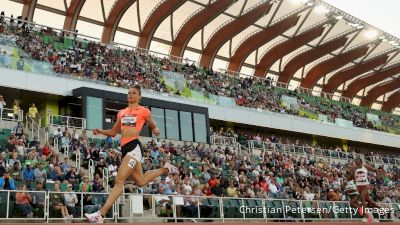 Rai Benjamin, Athing Mu And Sydney McLaughlin-Levrone Headline Mt. SAC
Rai Benjamin, Athing Mu And Sydney McLaughlin-Levrone Headline Mt. SACApr 19, 2024
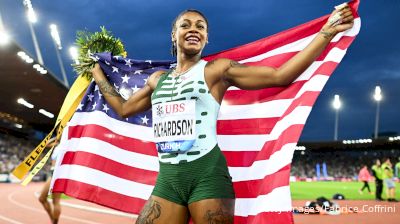 Diamond League Xiamen 2024 To Include USA Track Star Sha'Carri Richardson
Diamond League Xiamen 2024 To Include USA Track Star Sha'Carri RichardsonApr 19, 2024
 Marathon Master's World Record-Holder Kenenisa Bekele Excited For Return To London Marathon
Marathon Master's World Record-Holder Kenenisa Bekele Excited For Return To London MarathonApr 19, 2024
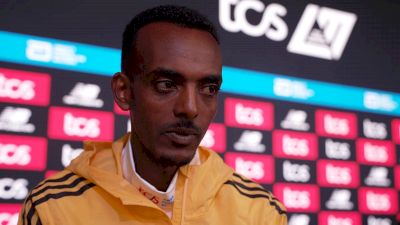 Tamirat Tola Is Confident In His Training Heading Into London Marathon
Tamirat Tola Is Confident In His Training Heading Into London MarathonApr 19, 2024
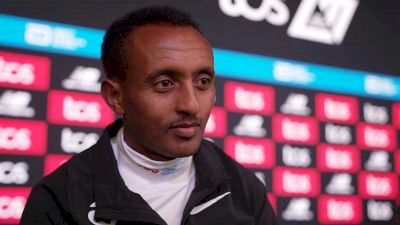 Leul Gebresilase Prepared For 2024 TCS London Marathon
Leul Gebresilase Prepared For 2024 TCS London MarathonApr 19, 2024
 Mic'd Up With Ritz At The TEN
Mic'd Up With Ritz At The TENApr 19, 2024
 FloSports Recognized Globally By International Sports Press Association
FloSports Recognized Globally By International Sports Press AssociationApr 18, 2024
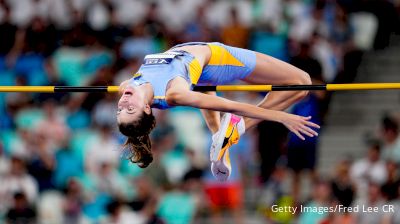 How To Watch The Diamond League Xiamen 2024
How To Watch The Diamond League Xiamen 2024Apr 18, 2024
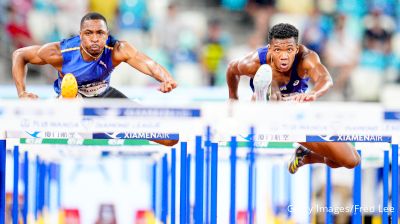 Diamond League Xiamen 2024 Schedule: What To Know
Diamond League Xiamen 2024 Schedule: What To KnowApr 18, 2024